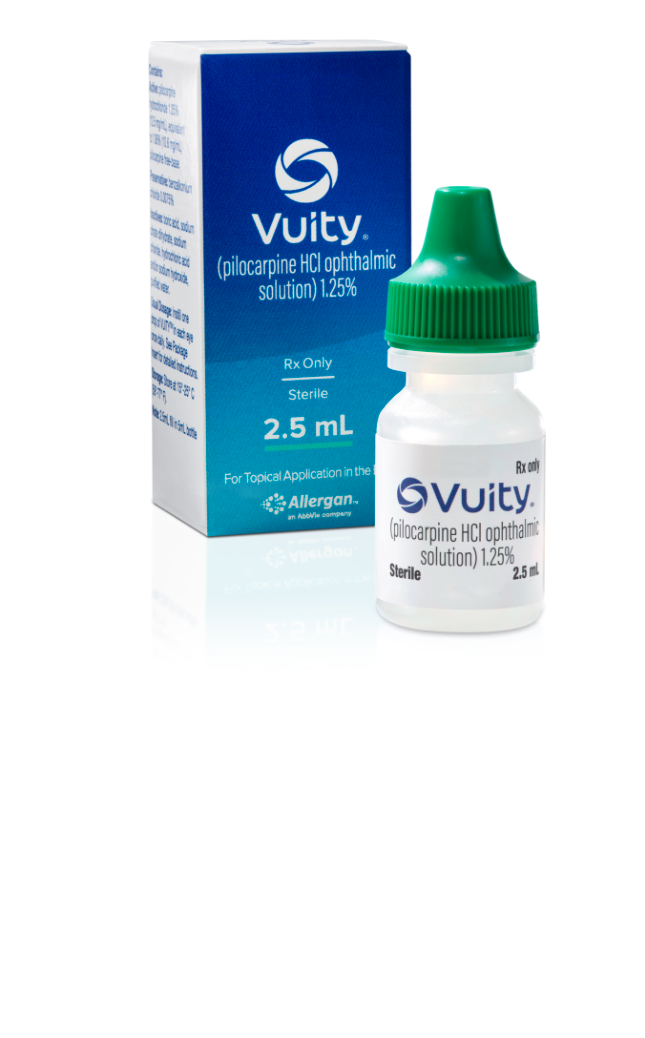Designed to balance
efficacy, safety, and tolerability1,2
FDA-approved eye drop
specifically designed for presbyopia.1,2
A daily treatment
for mild-to-moderate patients
with presbyopia.1,3

Designed to balance
efficacy, safety, and tolerability1,2

*In vitro data. Clinical significance is unknown.
The pH range in the bottle is between 3.5 and 5.5.1
*In vitro data. Clinical significance is unknown. The pH range in the bottle is between 3.5 and 5.5.1
Primary endpoint was the proportion of patients gaining ≥3 lines in mesopic, high-contrast, binocular distance-corrected near visual acuity (DCNVA) without losing more than 1 line (5 letters) of corrected distance visual acuity (CDVA) with the same refractive correction at Day 30, Hour 3.1
Change from baseline in photopic, high-contrast, binocular distance-corrected intermediate visual acuity (DCIVA) at Day 30, Hour 3 was a prespecified secondary endpoint.5

NEARLY 9/10
Trial participants [N=76] surveyed would ask their eye doctor for VUITY®†6
†Assessed by a survey in a subset of participants in the VUITY® arm of GEMINI 1 and GEMINI 2 studies.
Not an actual patient
VUITY® (pilocarpine hydrochloride ophthalmic solution) 1.25% is indicated for the treatment of presbyopia in adults.
VUITY is contraindicated in patients with known hypersensitivity to any ingredient in the formulation.
Miotics, including VUITY, may cause accommodative spasm. Patients should be advised not to drive or operate machinery if vision is not clear (e.g., blurred vision). In addition, patients may experience temporary dim or dark vision with miotics, including VUITY. Patients should be advised to exercise caution in night driving and other hazardous activities in poor illumination.
Rare cases of retinal detachment and retinal tear have been reported with miotics, including VUITY. Individuals with pre-existing retinal disease are at increased risk. Therefore, examination of the retina is advised in all patients prior to the initiation of therapy. Patients should be advised to seek immediate medical care with sudden onset of flashing lights, floaters, or vision loss.
VUITY is not recommended to be used when iritis is present because adhesions (synechiae) may form between the iris and lens.
Contact lens wearers should be advised to remove their lenses prior to the instillation of VUITY and to wait 10 minutes after dosing before reinserting their contact lenses.
To prevent eye injury or contamination, care should be taken to avoid touching the dispensing bottle to the eye or to any other surface.
The most common adverse reactions (>5%) reported in clinical trials were headache, conjunctival hyperemia, and eye irritation.
Please see full Prescribing Information.
US-VUI-230052
AEs: adverse events. CDVA: corrected distance visual acuity. DCIVA: distance corrected intermediate visual acuity. DCNVA: distance corrected near visual acuity. FDA: Food and Drug administration.
References: 1. VUITY [package insert]. North Chicago, IL: AbbVie Inc. 2. Price FW, et al. Ophthalmol Sci. 2021; doi: https://doi.org/10.1016/j.xops.2021.100065. 3. Data on File, ABVRRTI73149. 4. Data on File, ABVRRTI73125.5. Data on File, ABVRRTI73127.6. Data on File, REF-87081.